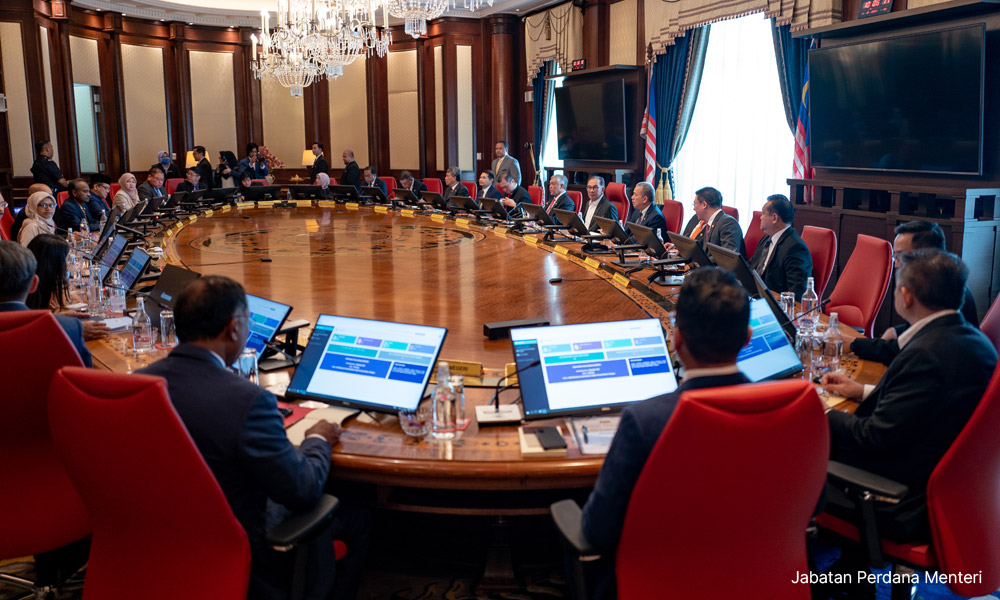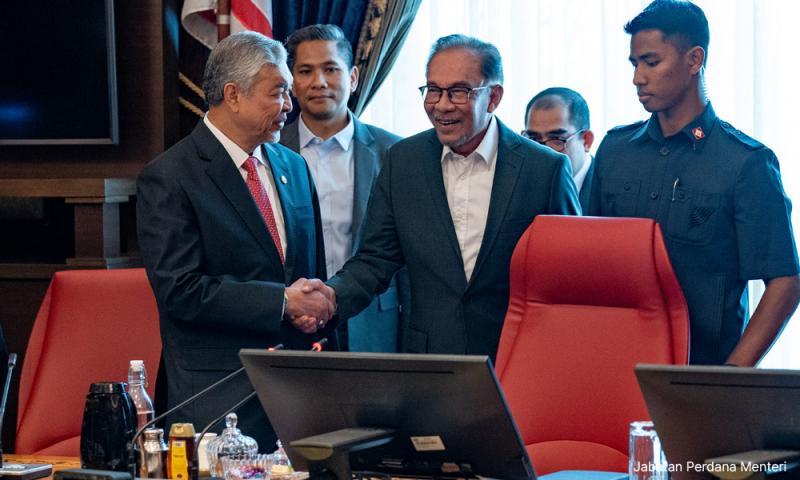COMMENT | Zahid as DPM necessary for stability, reforms
COMMENT | When Pakatan Harapan signed a historic memorandum of understanding (MOU) with the government led by then-prime minister Ismail Sabri Yaakob, it was with the intention of providing political stability just after Muhyiddin Yassin was forced to resign as the 8th prime minister.
At the same time, important institutional reforms, most notably the anti-hopping bill, were also included in the MOU. These concessions were only made possible because Ismail Sabri knew that he was in a politically vulnerable position.
This was not the first time Harapan had worked with Umno leaders on issues of political stability and institutional reforms. In December 2020, Harapan state assemblypersons in Perak voted with the majority of Umno reps to reject a motion of confidence in the then menteri besar, Bersatu’s Ahmad Faizal Azumu.
In exchange, the Perak Umno MB, Saarani Mohamad, agreed to provide equal constituency allocations to all reps and allowed opposition reps to participate in local and district levels government meetings where important local-level decisions were made.
The Umno’s Johor MB, Hasni Mohammad, who was installed shortly after the Sheraton Move in February 2020, also made certain political concessions to Harapan assemblypersons, including increasing their constituency allocations, because of the razor-thin one-seat majority of his then-governing coalition.
The possibility of working with Umno to form a government post-GE15 had already been raised by DAP secretary-general, Anthony Loke, back in May 2021 and repeated in August 2022.
Although he was heavily criticised for his statement then, including by many Harapan supporters, many of the same critics would later welcome the support of Umno’s 26 MPs for Anwar Ibrahim as prime minister post-GE15 when it was clear what the alternative would be.
In the context of a hung Parliament and to dampen criticism among the Malay electorate that a Harapan-led government would be controlled by the DAP and the non-Malays, the inclusion of Umno in a unity government makes logical and political sense.
The appointment of Ahmad Zahid Hamidi as the deputy prime minister and a cabinet minister should be seen in a similar light – to provide much-needed political stability and to deliver institutional reforms.
As explained by the Umno secretary-general, Ahmad Maslan, the appointment is based on Zahid’s position as the president of Umno.
This means that whoever wins the Umno party elections, slated for the first quarter of 2023, will have the assurance of being appointed as deputy prime minister if a new president is elected.
In addition, the fact that there are six Umno Ministers (compared to only four from the DAP, despite DAP having 40 MPs to Umno’s 26) will also help the Umno leadership explain to its members that they are not in an inferior position in government compared to the DAP.
Anwar’s own appointment as finance minister may also have been a compromise solution so that Umno leaders can explain to their supporters why they did not get this much sought-after ministerial position.

Election manifestoes
The appointment of the first deputy prime minister from Sarawak, Fadillah Yusof, and five Ministers from the GPS coalition was also needed to cement GPS’ commitment to the new unity government. The concession to GPS that no DAP Sarawak MPs be included in the cabinet was also granted.
With the inclusion of BN, GPS, GRS, Warisan and a number of independent MPs, Anwar’s government should easily obtain sufficient votes to pass the motion of confidence during the upcoming parliamentary session later this month. But what are the reforms which we can look forward to under this unity government?
For this, we need to refer to the election manifestoes of the respective coalitions. Although the manifestoes were not significant points of discussions and debates during the GE15 campaign, there are many points of agreement between Harapan and the BN election promises.
The BN manifesto explicitly mentions the move to a more “needs-based policy” approach (peralihan daripada dasar berasakan kaum kepada berasakan keperluan), highlights the need for greater decentralisation to the states and promises to amend the federal constitution to explicitly allow for citizenship rights to children of Malaysian mothers who are born overseas.
These election promises can form the basis of the institutional reform agenda of the unity government.
The controversy surrounding the appointment of Zahid as DPM should not detract from the other positive takeaway points from the cabinet appointments.
The economic team comprising Anwar as finance minister, Rafizi as the economic minister and Tengku Zafrul Abdul Aziz as the international trade and industry minister should give investors and the business community confidence that the economy will be well-managed, that pro-FDI policies will continue, and new sources of economic growth can be generated and enhanced.
Experienced former ministers from the different coalitions – Khaled Nordin and Azalina Othman Said from Umno, Saifuddin Nasution Ismail from PKR, Mohamad Sabu and Salahuddin Ayob from Amanah, Alexander Nanta Linggi and Nancy Shukri from GPS – will give sufficient weight and heft to the new cabinet.
Experienced MPs who are also familiar public faces such as Nga Kor Ming (DAP), Chang Lih Kang (PKR), Nik Nazmi Nik Ahmad (PKR), Fahmi Fadzil (PKR) and Hannah Yeoh (DAP), will bring new ideas and energies to their respective Ministries.
What may be more concerning would be the appointment of two first-time MPs to two heavyweight portfolios – Fadlina Sidek (Nibong Tebal) as the education minister and Zaliha Mustafa (Sekijang) as the health minister.
They will have their work cut out for them in managing these two huge and complicated ministries which also invite plenty of public scrutinies.
If Harapan’s 22 months in government post GE14 has taught us anything, it should be that we should not expect results to be delivered overnight. We should give some room for the policy agenda of the unity government to be set by the prime minister and his team.
We should anticipate the appointment of many capable deputy ministers among the ranks of the MPs who are not yet part of the front bench.
We should expect some level of political intrigue and uncertainty in 2023 due to the Umno party elections and the state elections in Kedah, Kelantan, Terengganu, Penang, Selangor and Negeri Sembilan.
We should hope for a stable government that can last the full five-year term and show slow and steady progress in the delivery political and economic reform during this time.
ONG KIAN MING is a former Bangi MP.
The views expressed here are those of the author/contributor and do not necessarily represent the views of Malaysiakini.
RM12.50 / month
- Unlimited access to award-winning journalism
- Comment and share your opinions on all our articles
- Gift interesting stories to your friends
- Tax deductable
